2020中考英语一般将来时导学案外研版
七年级英语下册 知识导学 Module 4 Life in the future一般将来时词句精讲精练 (新版)外研版

Module 4 —一般将来时【概念引入】一般将来时表示将来某个时间要发生的动作或存在的状态,将来经常或反复发生的动作,常与表示将来的时间状语连用。
如:tomorrow , tomorrow morning / afternoon …,the day after tomorrow , next year , next month … , from now on (从现在开始),in an hour (一小时后),in two days / weeks …等。
例如:What are you going to do next Sunday ?下周日你打算做什么?The American basketball team will arrive in Beijing tomorrow.美国篮球队明天要到北京。
【语法讲解】1. be going to+动词原形结构(1)表示主体现在的意图,即打算在最近或将来要做某事,主语通常指人。
在被动结构中,主语也可指物,但动作的执行者仍然是人。
例如:We are going to have a class meeting this afternoon. 今天下午我们打算开班会。
She’s going to be a teacher. 她打算作一名教师。
The wall is going to be brushed white. 墙要被刷成白色的。
(2)表示主观判断客观上要发生的事,或根据目前的迹象或预测很可能要发生的事。
例如:Look at the black clouds. It’s going to rain. 看那些乌云,快要下雨了。
Don’t go out. It is going to rain. 不要出去,要下雨了。
(3) there be句型可以与be going to 结构连用。
例如:There is going to be a football match on TV this evening.今晚电视上有一场足球比赛。
高中英语Module1LifeinFutureSectionⅢGrammar——将来进行时与一般将来时教案(含解析)外研版必修4

Section ⅢGrammar——将来进行时与一般将来时1.将来进行时的用法(1)表示将来某一时刻或某段时间正在进行的动作,常与at this time tomorrow,at 4 o'clock tomorrow afternoon,at this time next week等时间状语连用。
What will you be doing at eight o'clock this evening?今天晚上8点你将在干什么?At this time tomorrow I shall be flying to London.明天这个时候我将在飞往伦敦的途中。
(2)表示对将来的情况或结果的预测,不表示动作正在进行。
If we keep working hard like this,we will be making a miracle.如果我们继续这样努力工作的话,我们会创造奇迹的。
(3)表示按计划或安排将要发生的动作,此时不带感情色彩,有时表委婉的语气。
Tomorrow is my day on duty,so I shan't be coming home.明天我要值班,所以不回家了。
Will you be having some tea?喝点茶吗?[即时训练1] 单句语法填空①Jane can't attend the meeting at 3 o'clock this afternoon because she will be teaching (teach) a class at that time.②—Could I use your car tomorrow morning?—Sure.I will be writing (write) a report at home.③At ten o'clock tomorrow,she will be working(work) in her office.2.一般将来时的用法(1)will/shall do表示在将来某个时间要发生的动作或存在的状态,常与表示将来的时间状语连用;will do也可指临时决定做某事。
(完整版)一般将来时学案
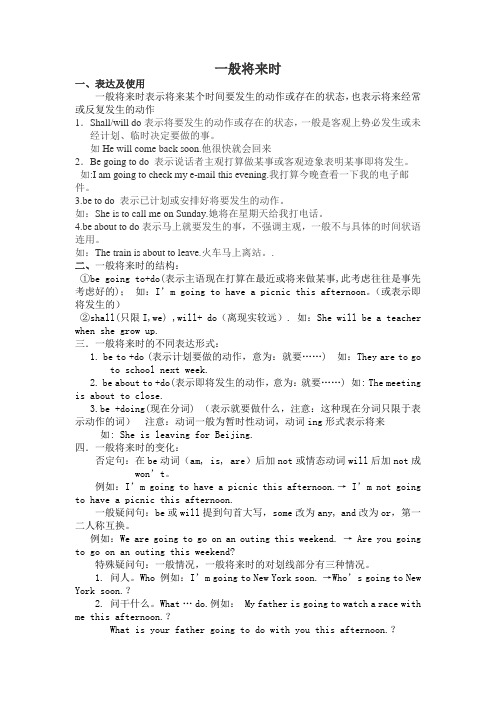
一般将来时一、表达及使用一般将来时表示将来某个时间要发生的动作或存在的状态,也表示将来经常或反复发生的动作1.Shall/will do表示将要发生的动作或存在的状态,一般是客观上势必发生或未经计划、临时决定要做的事。
如He will come back soon.他很快就会回来2.Be going to do 表示说话者主观打算做某事或客观迹象表明某事即将发生。
如:I am going to check my e-mail this evening.我打算今晚查看一下我的电子邮件。
3.be to do 表示已计划或安排好将要发生的动作。
如:She is to call me on Sunday.她将在星期天给我打电话。
4.be about to do表示马上就要发生的事,不强调主观,一般不与具体的时间状语连用。
如:The train is about to leave.火车马上离站。
.二、一般将来时的结构:①be going to+do(表示主语现在打算在最近或将来做某事,此考虑往往是事先考虑好的);如:I’m going to have a picnic this a fternoon。
(或表示即将发生的)②shall(只限I,we) ,will+ do(离现实较远). 如:She will be a teacher when she grow up.三.一般将来时的不同表达形式:1. be to +do (表示计划要做的动作,意为:就要……) 如:They are to goto school next week.2. be about to +do(表示即将发生的动作,意为:就要……) 如: The meeting is about to close.3.be +doing(现在分词) (表示就要做什么,注意:这种现在分词只限于表示动作的词)注意:动词一般为暂时性动词,动词ing形式表示将来如: She is leaving for Beijing.四.一般将来时的变化:否定句:在be动词(am, is, are)后加not或情态动词will后加not成won’t。
导学案基本模式(一般将来时)
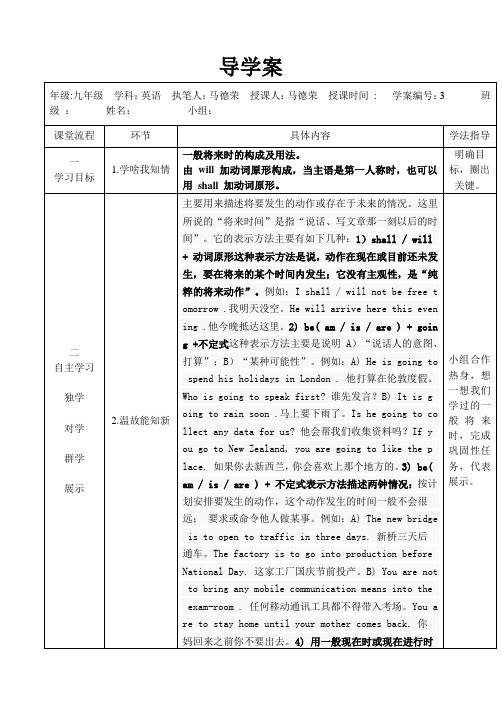
六 知识梳理
11.我的收获
反馈目标:学习目标完成了吗? 我的学习有效吗? 一句话收获:
2. -How long _____ you _____(study)in our country? -I _____(plan)to be here for about one more year. 3. I ______(be)tired. I ______(go)to bed early tonight. 4. Mary's birthday is next Monday, her mother _____ (give)her a present. 5. It is very cold these days. It ______(snow)soon. 6. -_____ you _____(be)here this Saturday? -No. I ______(visit)my teacher. 7. -______ I ______ ( get ) you a copy of today's newspaper? -Thank you. 8. I am afraid there ______ ( be ) a meeting this afternoon. I can't join you. 9. Mike ______(believe, not)this until he ______ (see)it with his own eyes. 10. Most of us don't think their team ______(win). 6.小组对话 展示准备 1. 交流学习成果。 2. 确定本组认同的答案。 3. 归纳表示时间的词。 1.全体发言,谈发现要有理有据,提问题要愉当而具有启 发性,组内交流解决 2.提交有价值、感兴趣但独立解决不了的问题。 3.人员分工合理,先择展示内容,设计展示形式,进行展 示准备。 展示内容: 词汇——句子——语法——问题——发现——归类总结 (任选突出的 1~2 种) 4. 各组自选代表,自先角度,自创形式板演。 5. 各组对板演内容进一步解释或讲解或提问或引领大家 学习。其他同学要根据自己理解适时提问、补充、质 疑。 (各小组 1~2 人讲解,其他倾听、记录) 6. 语言展示:精心设计的朗读、小演讲、顺口溜、独到 的发现或其他创造性的语言展示。 7. 通过学习,各组还有什么不明白或希望了解的内容。 1.我叔叔今晚要来。 2.他没有打算住那座小屋。
外研版英语英语一般将来时技巧和方法外研版及练习题含答案百度文库

外研版英语英语一般将来时技巧和方法外研版及练习题含答案百度文库一、初中英语一般将来时1.—You'd better take an umbrella. The weather report says it in the afternoon.— Thank you. I will put one in my bag.A. will rainB. rainsC. is raining【答案】 A【解析】【分析】句意:——你最好带把伞。
天气预报说是下午要下雨。
——谢谢你。
我会在包里放一个。
A一般将来时,B一般现在时,C现在进行时,根据 in the afternoon和 I will put one in my bag 可知时态是一般将来时,故选A。
【点评】考查时态,注意一般将来时的用法。
2.—May I speak to Mr. Smith?—Sorry, he _______ Australia. But he _______ in two days.A. has been to; will come backB. has gone to; will be backC. has been in; would come backD. is leaving for; doesn't come back【答案】 B【解析】【分析】考查动词的时态。
句意:——我可以和史密斯先生通话吗?——对不起,他去澳大利亚了。
但是两天后回来。
have gone to“去某地了(还没回来)”;由时间状语in two days可确定第二个空用一般将来时,故答案为B项。
3.Jack ______ a good rest as soon as he finishes the exam.A. hasB. hadC. is havingD. will have【答案】 D【解析】【分析】句意:Jack一完成他的考试就要好好的休息一下。
新外研版Book3 Module3导学案
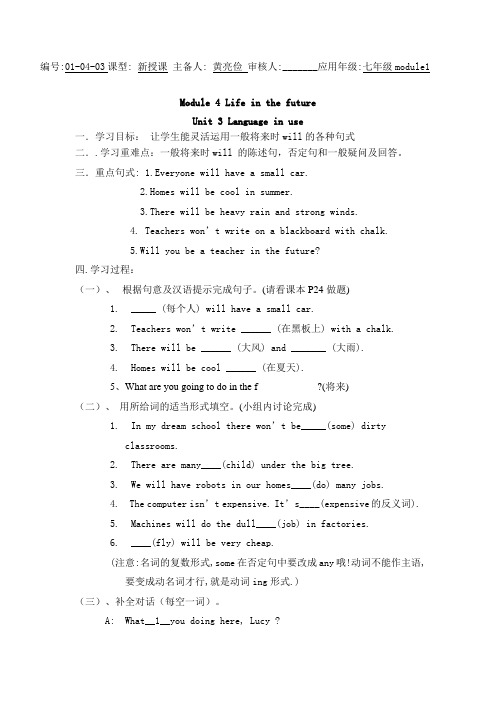
编号:01-04-03课型: 新授课主备人: 黄亮俭审核人:_______应用年级:七年级module1Module 4 Life in the futureUnit 3 Language in use一.学习目标:让学生能灵活运用一般将来时will的各种句式二..学习重难点:一般将来时will 的陈述句,否定句和一般疑问及回答。
三.重点句式: 1.Everyone will have a small car.2.Homes will be cool in summer.3.There will be heavy rain and strong winds.4. Teachers won’t write on a blackboard with chalk.5.Will you be a teacher in the future?四.学习过程:(一)、根据句意及汉语提示完成句子。
(请看课本P24做题)1._____ (每个人) will have a small car.2.Teachers won’t write ______ (在黑板上) with a chalk.3.There will be ______ (大风) and _______ (大雨).4.Homes will be cool ______ (在夏天).5、What are you going to do in the f____________?(将来)(二)、用所给词的适当形式填空。
(小组内讨论完成)1.In my dream school there won’t be_____(some) dirtyclassrooms.2.There are many____(child) under the big tree.3.We will have robots in our homes____(do) many jobs.4.The computer isn’t expensive. It’s____(expensive的反义词).5.Machines will do the dull____(job) in factories.6.____(fly) will be very cheap.(注意:名词的复数形式,some在否定句中要改成any哦!动词不能作主语,要变成动名词才行,就是动词ing形式.)(三)、补全对话(每空一词)。
外研版英语中考英语一般将来时-知识点归纳与练习

外研版英语中考英语一般将来时-知识点归纳与练习一、初中英语一般将来时1.If you go to bed earlier, you tired in the morning.A. will feelB. don't feelC. won't feelD. didn't feel【答案】 C【解析】【分析】句意:如果你上床睡觉早些,在早上你就不会感觉到累了。
此题考查if 引导的条件状语从句,主句一般将来时,从句用一般现在时。
根据句意,故选C。
【点评】考查动词时态。
掌握主将从现的句子结构。
2.With the development of science and technology, robot cooks ______ in our families in the future.A. appearB. appearedC. will appearD. were appearing【答案】 C【解析】【分析】句意:随着科学技术的发展,在未来机器人厨师将出现在我们的家庭中. 根据in the future可知,此句表示动作发生在将来,所以用一般将来时态;一般将来时态结构为:will+动词原形,故选C.【点评】判断动词的时态,要通过所给的时间状语、提示词或语境去判断动词存在的状态. 一般将来时态结构为:will+动词原形.3.Mr. Green, a famous writer, ______our school next week.A. visitedB. visitsC. was visitingD. will visit【答案】 D【解析】【分析】句意:格林先生,一位著名的作家,下周要来我们学校参观。
A是一般过去时;B是一般现在时;C是过去进行时;D是一般将来时。
根据next week可知此处用一般将来时,故答案为D。
【点评】考查动词的时态,注意找语境中的时间状语。
4.— Your father has gone to Shenzhen on business, hasn't he?—Yes. And he ________ in two weeks.A. will returnB. has returnedC. returnedD. returns【答案】 A【解析】【分析】句意:——你的父亲已经去深圳出差,不是吗?——是的,他打算两周后回来。
2020_2021学年高中英语Module1LifeintheFutureGrammar学案外研版必
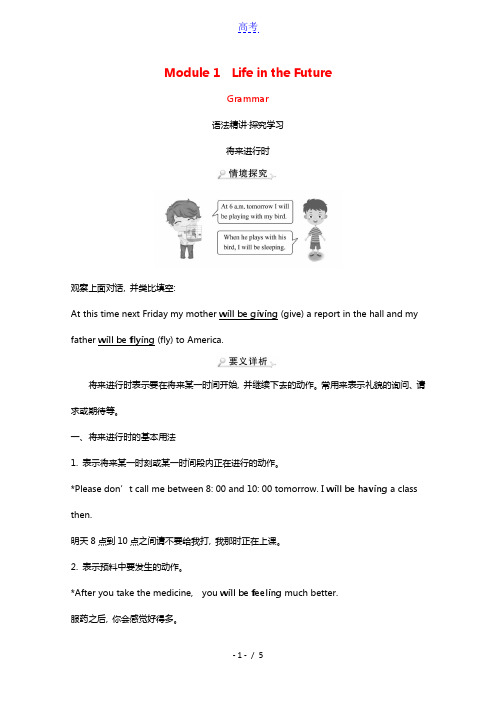
Module 1 Life in the FutureGrammar语法精讲·探究学习将来进行时观察上面对话, 并类比填空:At this time next Friday my mother will be giving (give) a report in the hall and my father will be flying (fly) to America.将来进行时表示要在将来某一时间开始, 并继续下去的动作。
常用来表示礼貌的询问、请求或期待等。
一、将来进行时的基本用法1. 表示将来某一时刻或某一时间段内正在进行的动作。
*Please don’t call me between 8: 00 and 10: 00 tomorrow. I will be having a class then.明天8点到10点之间请不要给我打, 我那时正在上课。
2. 表示预料中要发生的动作。
*After you take the medicine, you will be feeling much better.服药之后, 你会感觉好得多。
*Hurry up! The guests will be arriving at any minute!快! 客人随时会来!* (2018·全国卷Ⅱ)If you work out in the mornings, then you will be getting the calorie burning benefits for the whole day, not in your sleep. 如果你早晨锻炼, 有利于你消耗一整天的卡路里, 而不是在睡眠中消耗。
(1)—Will you be available at three o’clock tomorrow afternoon?—No. I will be attending (attend) a lecture then.(2)I will be flying (fly) from Miami to New York to meet the other members of the group at this time tomorrow.(3)I will be watching(watch) my favorite TV show at seven o’clock this evening.二、将来进行时与一般将来时、将来完成时的区别表示将来某一时间正在进行的动作、预料要发将来进行时生的或即将发生的动作多表示没有经过事先安排, 在说话时临时做出一般将来时的决定, 有时还可表示邀请或习惯将来完成时表示将来某个时间之前已完成的动作*I will be reading a book at 10: 00 tomorrow morning.明天上午10点我(肯定)正在看书。
外研版英语中考英语 一般将来时专项讲解及练习
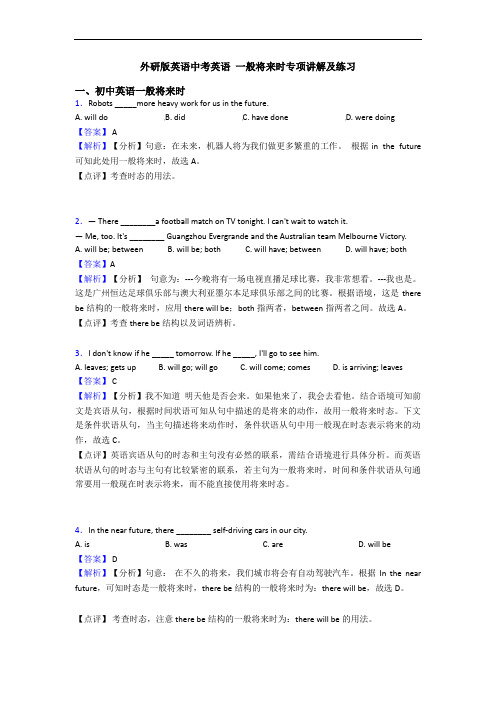
外研版英语中考英语一般将来时专项讲解及练习一、初中英语一般将来时1.Robots _____more heavy work for us in the future.A. will doB. didC. have doneD. were doing【答案】 A【解析】【分析】句意:在未来,机器人将为我们做更多繁重的工作。
根据in the future 可知此处用一般将来时,故选A。
【点评】考查时态的用法。
2.— There ________a football match on TV tonight. I can't wait to watch it.— Me, too. It's ________ Guangzhou Evergrande and the Australian team Melbourne Victory.A. will be; betweenB. will be; bothC. will have; betweenD. will have; both【答案】A【解析】【分析】句意为:---今晚将有一场电视直播足球比赛,我非常想看。
---我也是。
这是广州恒达足球俱乐部与澳大利亚墨尔本足球俱乐部之间的比赛。
根据语境,这是there be结构的一般将来时,应用there will be;both指两者,between指两者之间。
故选A。
【点评】考查there be结构以及词语辨析。
3.I don't know if he _____ tomorrow. If he _____, I'll go to see him.A. leaves; gets upB. will go; will goC. will come; comesD. is arriving; leaves【答案】 C【解析】【分析】我不知道明天他是否会来。
如果他来了,我会去看他。
结合语境可知前文是宾语从句,根据时间状语可知从句中描述的是将来的动作,故用一般将来时态。
外研版英语中考英语一般将来时技巧和方法外研版及练习题
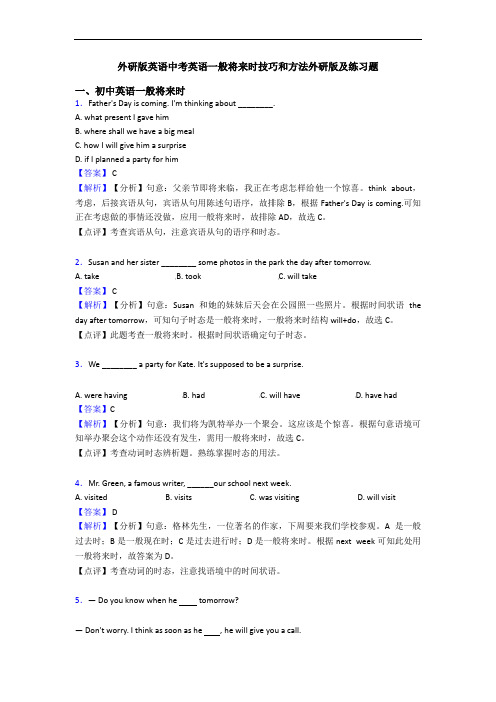
外研版英语中考英语一般将来时技巧和方法外研版及练习题一、初中英语一般将来时1.Father's Day is coming. I'm thinking about ________.A. what present I gave himB. where shall we have a big mealC. how I will give him a surpriseD. if I planned a party for him【答案】 C【解析】【分析】句意:父亲节即将来临,我正在考虑怎样给他一个惊喜。
think about,考虑,后接宾语从句,宾语从句用陈述句语序,故排除B,根据 Father's Day is coming.可知正在考虑做的事情还没做,应用一般将来时,故排除AD,故选C。
【点评】考查宾语从句,注意宾语从句的语序和时态。
2.Susan and her sister ________ some photos in the park the day after tomorrow.A. takeB. tookC. will take【答案】 C【解析】【分析】句意:Susan和她的妹妹后天会在公园照一些照片。
根据时间状语the day after tomorrow,可知句子时态是一般将来时,一般将来时结构will+do,故选C。
【点评】此题考查一般将来时。
根据时间状语确定句子时态。
3.We ________ a party for Kate. It's supposed to be a surprise.A. were havingB. hadC. will haveD. have had【答案】C【解析】【分析】句意:我们将为凯特举办一个聚会。
这应该是个惊喜。
根据句意语境可知举办聚会这个动作还没有发生,需用一般将来时,故选C。
【点评】考查动词时态辨析题。
新外研版七年级英语下册导学案(M4-Unit 3)
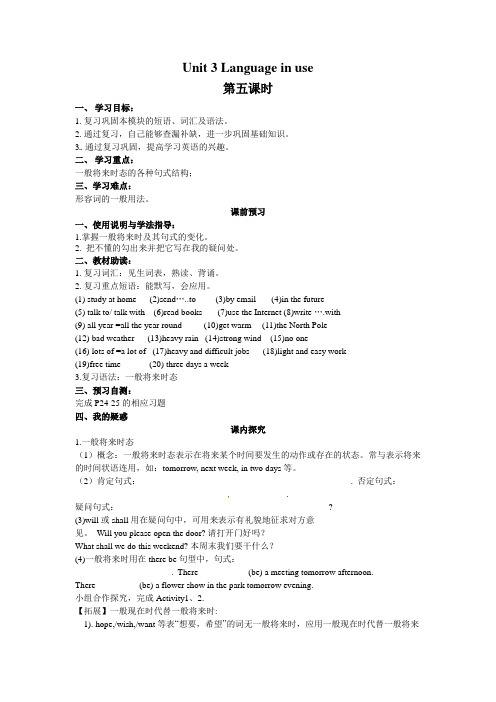
Unit 3 Language in use第五课时一、学习目标:1. 复习巩固本模块的短语、词汇及语法。
2. 通过复习,自己能够查漏补缺,进一步巩固基础知识。
3. 通过复习巩固,提高学习英语的兴趣。
二、学习重点:一般将来时态的各种句式结构;三、学习难点:形容词的一般用法。
课前预习一、使用说明与学法指导:1.掌握一般将来时及其句式的变化。
2. 把不懂的勾出来并把它写在我的疑问处。
二、教材助读:1. 复习词汇:见生词表,熟读、背诵。
2. 复习重点短语:能默写,会应用。
(1) study at home (2)send…..to (3)by email (4)in the future(5) talk to/ talk with (6)read books (7)use the Internet (8)write ….with(9) all year =all the year round (10)get warm (11)the North Pole(12) bad weather (13)heavy rain (14)strong wind (15)no one(16) lots of =a lot of (17)heavy and difficult jobs (18)light and easy work(19)free time (20) three days a week3.复习语法:一般将来时态三、预习自测:完成P24-25的相应习题四、我的疑惑课内探究1.一般将来时态(1)概念:一般将来时态表示在将来某个时间要发生的动作或存在的状态。
常与表示将来的时间状语连用,如:tomorrow, next week, in two days 等。
(2)肯定句式:________________________________________________. 否定句式:________________________________________________.疑问句式:________________________________________________?(3)will 或shall 用在疑问句中,可用来表示有礼貌地征求对方意见。
九年级英语,一般将来时的导学案
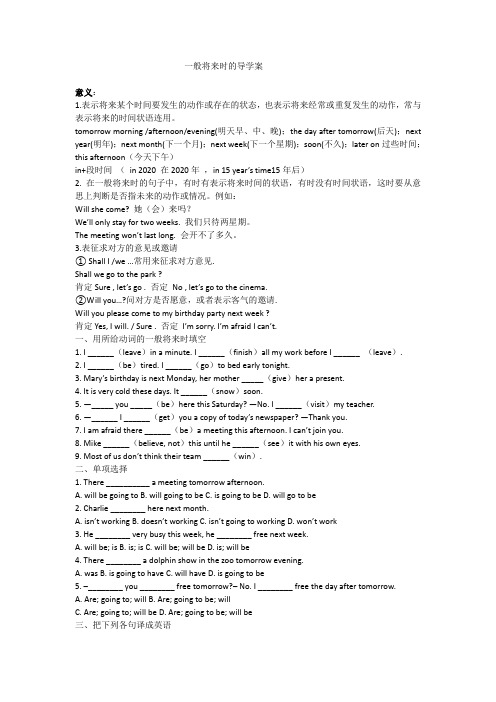
一般将来时的导学案意义:1.表示将来某个时间要发生的动作或存在的状态,也表示将来经常或重复发生的动作,常与表示将来的时间状语连用。
tomorrow morning /afternoon/evening(明天早、中、晚);the day after tomorrow(后天);next year(明年);next month(下一个月);next week(下一个星期);soon(不久);later on过些时间;this afternoon(今天下午)in+段时间(in 2020 在2020年,in 15 year’s time15年后)2. 在一般将来时的句子中,有时有表示将来时间的状语,有时没有时间状语,这时要从意思上判断是否指未来的动作或情况。
例如:Will she come? 她(会)来吗?We’ll only stay for two weeks. 我们只待两星期。
The meeting won’t last long. 会开不了多久。
3.表征求对方的意见或邀请① Shall I /we …常用来征求对方意见.Shall we go to the park ?肯定Sure , let’s go . 否定No , let’s go to the cinema.②Will you…?问对方是否愿意,或者表示客气的邀请.Will you please come to my birthday party next week ?肯定Yes, I will. / Sure . 否定I’m sorry. I’m afraid I can’t.一、用所给动词的一般将来时填空1. I ______(leave)in a minute. I ______(finish)all my work before I ______ (leave).2. I ______(be)tired. I ______(go)to bed early tonight.3. Mary’s birthday is next Monday, her mother _____(give)her a present.4. It is very cold these days. It ______(snow)soon.5. —_____ you _____(be)here this Saturday? —No. I ______(visit)my teacher.6. —______ I ______(get)you a copy of today’s newspaper? —Thank you.7. I am afraid there ______(be)a meeting this afternoon. I can’t join you.8. Mike ______(believe, not)this until he ______(see)it with his own eyes.9. Most of us don’t think their team ______(win).二、单项选择1. There __________ a meeting tomorrow afternoon.A. will be going toB. will going to beC. is going to beD. will go to be2. Charlie ________ here next month.A. isn’t workingB. doesn’t workingC. isn’t going to workingD. won’t work3. He ________ very busy this week, he ________ free next week.A. will be; isB. is; isC. will be; will beD. is; will be4. There ________ a dolphin show in the zoo tomorrow evening.A. wasB. is going to haveC. will haveD. is going to be5. –________ you ________ free tomorrow?– No. I ________ free the day after tomorrow.A. Are; going to; willB. Are; going to be; willC. Are; going to; will beD. Are; going to be; will be三、把下列各句译成英语1.我叔叔今晚要来。
人教版中考英语中考英语总复习 一般将来时(外研版)

人教版中考英语中考英语总复习一般将来时(外研版)一、初中英语一般将来时1.—Have you finished the poster for the party?—Not yet. I it in two days.A. finishB. finishedC. will finishD. have finished【答案】 C【解析】【分析】此题的关键点在“in two days”和一般将来时连用,故选C。
句意是:—你已经完成聚会的海报了吗?—还没有,我会在两个以后完成的。
【点评】本题考查介词短语“ in +时间段”用于一般将来时。
2.I’m so lucky because I see more cartoon characters next month.A. is able toB. will be able toC. be able toD. was able to【答案】B【解析】【分析】句意:我真幸运因为我下个月能看到更多的卡通人物。
next month表将来,因此用will be able to。
故选B。
【点评】考查一般将来时。
3.— There ________a football match on TV tonight. I can't wait to watch it.— Me, too. It's ________ Guangzhou Evergrande and the Australian team Melbourne Victory.A. will be; betweenB. will be; bothC. will have; betweenD. will have; both【答案】A【解析】【分析】句意为:---今晚将有一场电视直播足球比赛,我非常想看。
---我也是。
这是广州恒达足球俱乐部与澳大利亚墨尔本足球俱乐部之间的比赛。
根据语境,这是there be结构的一般将来时,应用there will be;both指两者,between指两者之间。
一般将来时导学案
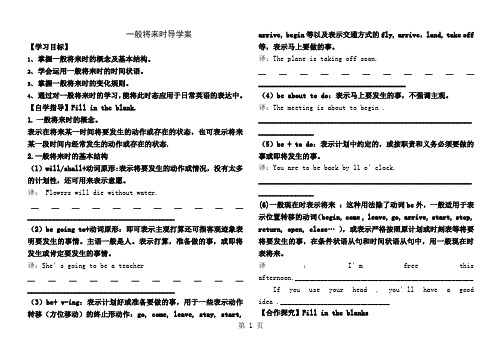
一般将来时导学案【学习目标】1、掌握一般将来时的概念及基本结构。
2、学会运用一般将来时的时间状语。
3、掌握一般将来时的变化规则。
4、通过对一般将来时的学习,能将此时态应用于日常英语的表达中。
【自学指导】Fill in the blank.1.一般将来时的概念。
表示在将来某一时间将要发生的动作或存在的状态,也可表示将来某一段时间内经常发生的动作或存在的状态.2.一般将来时的基本结构(1)will/shall+动词原形:表示将要发生的动作或情况,没有太多的计划性,还可用来表示意愿。
译: Flowers will die without water.___________________________________________________(2)be going to+动词原形:即可表示主观打算还可指客观迹象表明要发生的事情。
主语一般是人。
表示打算,准备做的事,或即将发生或肯定要发生的事情。
译:She’s going to be a teacher___________________________________________________(3)be+ v-ing:表示计划好或准备要做的事,用于一些表示动作转移(方位移动)的终止形动作:go, come, leave, stay, start, arrive, begin等以及表示交通方式的fly, arrive,land, take off 等,表示马上要做的事。
译:The plane is taking off soon.___________________________________________________ (4)be about to do:表示马上要发生的事,不强调主观。
译:The meeting is about to begin .__________________________________________________________ _______________(5)be + to do:表示计划中约定的,或按职责和义务必须要做的事或即将发生的事。
- 1、下载文档前请自行甄别文档内容的完整性,平台不提供额外的编辑、内容补充、找答案等附加服务。
- 2、"仅部分预览"的文档,不可在线预览部分如存在完整性等问题,可反馈申请退款(可完整预览的文档不适用该条件!)。
- 3、如文档侵犯您的权益,请联系客服反馈,我们会尽快为您处理(人工客服工作时间:9:00-18:30)。
2019中考英语:一般将来时一般将来时一.意义:1.表示将来某个时间要发生的动作或存在的状态,也表示将来经常或重复发生的动作,常与表示将来的时间状语连用。
tomorrow morning /afternoon/evening(明天早、中、晚);the day after tomorrow(后天);next year(明年);next month(下一个月);next week(下一个星期);soon(不久);later on 过些时间;this afternoon(今天下午)in+段时间( in 2020 在2020年,in 15 year’s time15年后)2. 在一般将来时的句子中,有时有表示将来时间的状语,有时没有时间状语,这时要从意思上判断是否指未来的动作或情况。
例如:Will she come? 她(会)来吗?We’ll only stay for two weeks. 我们只待两星期。
The meeting won’t last long. 会开不了多久。
3.表征求对方的意见或邀请① Shall I /we …常用来征求对方意见.Shall we go to the park ?肯定Sure , let’s go . 否定No , let’s go to the cinema.②Will you…?问对方是否愿意,或者表示客气的邀请.Will you please come to my birthday party next week ?肯定Yes, I will. / Sure . 否定I’m sorry. I’m afraid I can’t.二. 构成及变化一般将来时常用的两种结构(一)be going to+ do : 表示打算、准备做的事或即将发生或肯定要发生的事。
be going to +动词原形1.肯定句:主语+ be(am /,is,/ are) going to +动词原形+其它成份My sister is going to learn English next year. 我姐姐准备明年学英语。
2.否定句:主语+be(am / is / are)not going to +动词原形 +其它成份I am not going to(go to)the cinema tonight. 我今天晚上不打算去看电影。
3.一般疑问句:Be (am / is / are)+主语+going to+动词原型+其它成份…?Is your father going to play basketball with you ? No , he isn’t.你父亲打算和你去打篮球吗?不。
4.特殊疑问句:特殊疑问词(Wh-)+一般疑问句 ?Where are you going to spend Spring Fesital.? 春节你打算在哪过?shall/will+do : 表示将要发生的动作或情况,没有太多的计划性, 还用来表示意愿will /shall +动词原形 (在书面语中,主语是第一人称时,常用shall ,在口语中,所有人称都可以用will)1.肯定句:主语+will/shall+动词原形+其它成份I (shall) write to him next week. 下周我将给他写信。
2.否定句:主语 + will /shall+ not + 动词原形 +其它成份They won’t watch TV this evening.今天晚上他们不看电视。
3.一般疑问句:will/shall+主语 +动词原形+其它成份Will you stay at home with us tomorrow ?明天你和我们呆在家里好吗?4.特殊疑问句:特殊疑问词(Wh-) +一般疑问句When will your father be back? 你爸爸什么时侯回来?三.be going to与will的区别1.用be going to的情况有a.表示打算、准备做的事。
例如:We are going to put up a building here.我们打算在这里盖一座楼。
How are you going to spend your holidays?假期你准备怎样过?b.表示即将发生或肯定要发生的事。
例如:I think it is going to snow. 我看要下雪了。
There’s going to be a lot of trouble about this. 这事肯定会有很多麻烦。
2.用will时表示客观难以改变的事实,(1).It will rain tomorrow。
明天将要下雨.(2).It will be Teachers' Day the day after tomorrow.后天将是教师节.(3).My birthday will come.我生日将要到了.四.用现在进行时表示将来的动词go,come,leave,arrive ,start等.(1)She is coming here tomorrow.她明天将要来这儿.(2).When are you leaving here?你什么时间将要离开这儿?一、用所给动词的一般将来时填空1. I ______(leave)in a minute. I ______(finish)all my work before I ______ (leave).2. I ______(be)tired. I ______(go)to bed early tonight.3. Mary’s birthday is next Monday, her mother _____(give)her a present.4. It is very cold these days. It ______(snow)soon.5. —_____ you _____(be)here this Saturday? —No. I ______(visit)my teacher.6. —______ I ______(get)you a copy of today’s newspaper? —Thank you.7. I am afraid there ______(be)a meeting this afternoon. I can’t join you.8. Mike ______(believe, not)this until he ______(see)it with his own eyes.9. Most of us don’t think their team ______(win).二、单项选择1. There __________ a meeting tomorrow afternoon.A. will be going toB. will going to beC. is going to beD. will go to be2. Charlie ________ here next month.A. isn’t workingB. doesn’t workingC. isn’t going to workingD. won’t work3. He ________ very busy this week, he ________ free next week.A. will be; isB. is; isC. will be; will beD. is; will be4. There ________ a dolphin show in the zoo tomorrow evening.A. wasB. is going to haveC. will haveD. is going to be5. –________ you ________ free tomorrow?–No. I ________ free the day after tomorrow.A. Are; going to; willB. Are; going to be; willC. Are; going to; will beD. Are; going to be; will be6. Mother ______me a nice present on my next birthday.A. will givesB. will giveC. givesD. give7. – Shall I buy a cup of tea for you?–________. (不,不要。
)A. No, you won’tB. No, you aren’t.C. No, please don’tD. No, please.8. – Where is the morning paper?– I ________ it for you at once.A. getB. am gettingC. to getD. will get9. ________ a concert next Saturday?A. There will beB. Will there beC. There can beD. There are10. If they come, we ________ a meeting.A. haveB. will haveC. hadD. would have11. He ________ her a beautiful hat on her next birthday.A. givesB. gaveC. will givingD. is going to give12. He ________ to us as soon as he gets there.A. writesB. has writtenC. will writeD. wrote13. He ________ in three days.A. coming backB. came backC. will come backD. is going to coming back14. I f it ________ tomorrow, we’ll go roller-skating.A. isn’t rainB. won’t rainC. doesn’t rainD. doesn’t fine15. – Will his parents go to see the Terra Cotta Warriors tomorrow?– No, ________ (不去).A. they willn’tB. they won’t.C. they aren’tD. they don’t.16. Who ________ we ________ swimming with tomorrow afternoon?A. will; goB. do; goC. will; goingD. shall; go17. We ________ the work this way next time.A. doB. will doC. going to doD. will doing18. Tomorrow he ________ a kite in the open air first, and then ________ boating in the park.A. will fly; will goB. will fly; goesC. is going to fly; will goesD. flies; will go19. The day after tomorrow they ________ a volleyball match.A. will watchingB. watchesC. is watchingD. is going to watch20. There ________ a birthday party this Sunday.A. shall beB. will beC. shall going to beD. will going to be21. They ________ an English evening next Sunday.A. are havingB. are going to haveC. will havingD. is going to have22. ________ you ________ free next Sunday?A. Will; areB. Will; beC. Do; beD. Are; be23. He ________ there at ten tomorrow morning.A. willB. isC. will beD. be24. ________ your brother ________ a magazine from the library?A. Are; going to borrowB. Is; going to borrowC. Will; borrowsD. Are; going to borrows25. – Shall I come again tomorrow afternoon?–________ (好的).A. Yes, pleaseB. Yes, you will.C. No, pleaseD. No, you won’t.26. It ________ the year of the horse next year.A. is going to beB. is going toC. will beD. will is27. ________ open the window?A. Will you pleaseB. Please will youC. You pleaseD. Do you28. –Let’s go out to play football, shall we?– OK. I ________.A. will comingB. be going to comeC. comeD. am coming29. It ________ us a long time to learn English well.A. takesB. will takeC. spendsD. will spend30. The train ________ at 11 .A. going to arriveB. will be arriveC. is going toD. is arriving三、把下列各句译成英语1.我叔叔今晚要来。
